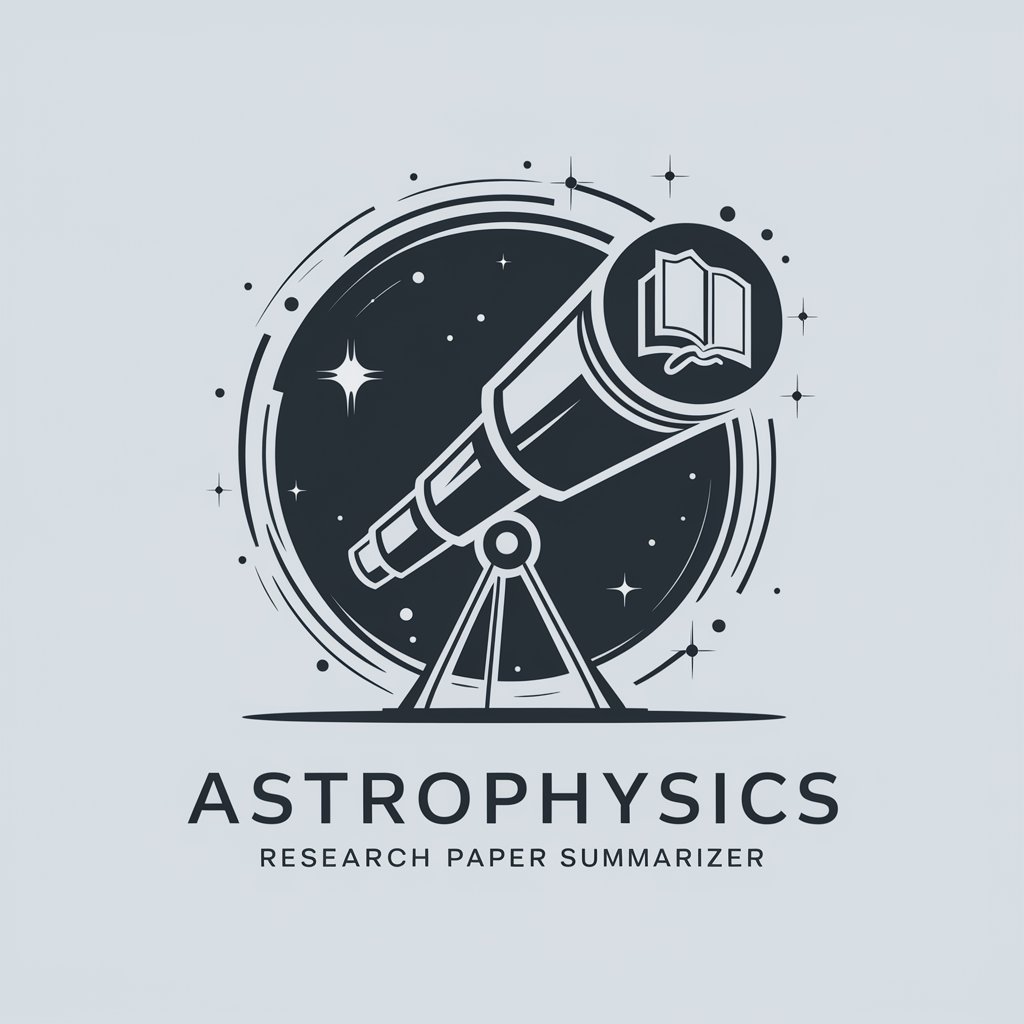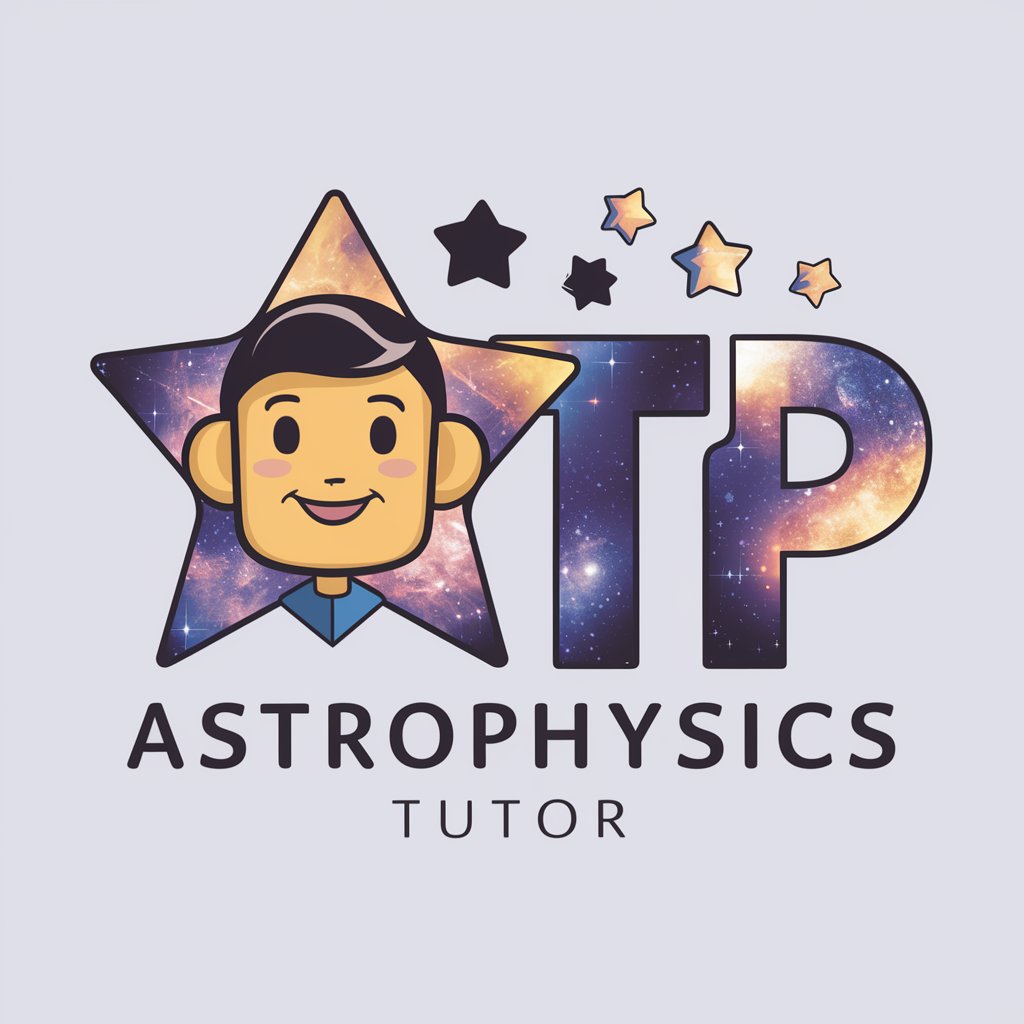Astrophysics Research Paper Summarizer - Astrophysics Summarization

Welcome to your astrophysics research summarizer.
AI-powered astrophysics research summarizer.
Summarize the key findings of the paper on
Provide an overview of the methodologies used in
Highlight the main conclusions of the research focused on
Extract and present the significant data points from the study on
Get Embed Code
Overview of Astrophysics Research Paper Summarizer
Astrophysics Research Paper Summarizer is designed to provide concise and accurate summaries of astrophysics research papers. Its primary goal is to assist users in quickly understanding the key findings, methodologies, and conclusions of extensive and often complex scientific documents. This tool is especially useful in scenarios where researchers or students need to grasp the essence of a paper without going through the entire document. For example, a student might use the summarizer to quickly gather insights from multiple papers for a literature review or a researcher could use it to ascertain the relevance of papers for their ongoing study. Powered by ChatGPT-4o。

Main Functions of Astrophysics Research Paper Summarizer
Extraction of Key Findings
Example
Summarizing the core discoveries or contributions of a paper, such as detailing the observed properties of a newly discovered exoplanet.
Scenario
A scientist quickly gathering recent discoveries in their field to prepare for a conference presentation.
Methodology Clarification
Example
Outlining the specific observational techniques or computational models used in the research, such as the use of spectroscopy to analyze star compositions.
Scenario
A graduate student synthesizing methodological approaches for their thesis chapter on stellar compositions.
Conclusion Highlighting
Example
Presenting the conclusions drawn in the research, like the implications of dark matter distributions in galaxy formations.
Scenario
An educator preparing lecture materials that include recent findings and their implications for galaxy formation theories.
Ideal Users of Astrophysics Research Paper Summarizer
Academic Researchers
Researchers in the field of astrophysics who require quick insights from multiple papers to aid in their studies, grant writing, or when preparing for presentations.
Students
Undergraduate and graduate students who need to integrate vast amounts of scholarly articles into their studies, thesis writing, or exam preparations, thereby saving time and enhancing comprehension.
Educators
Professors and teachers looking for a tool to help integrate the latest research findings into their curriculum, enhancing the educational content with up-to-date scientific data.

Guidelines for Using the Astrophysics Research Paper Summarizer
Initiate Your Trial
Access the service without the need for signup or ChatGPT Plus by visiting yeschat.ai for a complimentary trial.
Select a Research Paper
Choose an astrophysics research paper you wish to summarize. Ensure it's in a readable format (PDF, DOCX, or plain text) for optimal compatibility.
Upload or Paste Content
Use the tool's interface to either upload the document or paste the text of the research paper directly into the provided field.
Customize Your Summary
Specify any particular aspects or sections of the paper you're interested in, such as methodology, findings, or conclusions, to tailor the summary to your needs.
Receive Summary
Submit your request and receive a concise, academically-toned summary of the research paper, highlighting key points and findings.
Try other advanced and practical GPTs
Astrophysics Tutor
Unlocking the cosmos with AI-powered guidance.

GeniusMind
Empower Your Decisions with AI

Ayurveda Insights
AI-powered Ayurvedic product finder

Ayurveda Advisor
Empowering health with AI-driven Ayurvedic advice

Ayurveda Guru
Empowering wellness through ancient wisdom

Ayurveda Guide
Explore Traditional Wellness, Powered by AI

Employees
Empower Your Words with AI

Go (GoLang) Assistant: No Filler Texts
AI-powered Go Code Mastery

Friendly Weather Guide
Visualize Weather with AI

Line draft color filler
Transform Lines into Masterpieces

US Immigration Filler
Streamlining your US immigration process with AI-powered guidance.

Pilled Perspective
Delving into Ideologies, Powering Independent Thought

Frequently Asked Questions about the Astrophysics Research Paper Summarizer
What types of documents can the Astrophysics Research Paper Summarizer process?
The tool can process research papers in PDF, DOCX, or plain text formats, provided they are related to astrophysics and presented in a clear, readable manner.
Can I specify sections of the paper for focused summarization?
Yes, the tool allows users to specify particular sections of the research paper, such as the methodology, results, or discussion, for a more focused summary.
Is there a word limit for the research papers submitted for summarization?
While there's no strict word limit, optimal performance is observed with documents under 20,000 words due to processing constraints and the goal of generating concise summaries.
How does the summarizer handle complex astrophysical terminology?
The summarizer is designed with advanced language models trained on scientific literature, enabling it to accurately interpret and summarize complex astrophysical terms and concepts.
Can the tool generate summaries in languages other than English?
Currently, the summarizer primarily supports English-language documents. Efforts to incorporate multilingual support are ongoing to accommodate a wider range of research papers.
